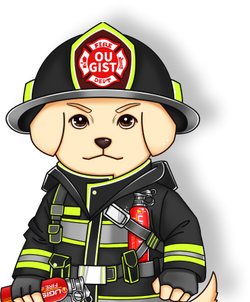Fire safety is a crucial aspect of protecting lives and property. In the event of a fire, having the right fire extinguisher can make all the difference. Two commonly used types of fire extinguishers are Class ABC and Class BC, each designed for specific fire types. In this blog, we'll delve into the differences between these two classes and their intended uses.

Class ABC Fire Extinguishers: Versatile Protection
Class ABC fire extinguishers are versatile and widely used because they can combat fires in multiple categories, namely Class A, Class B, and Class C fires. Let's break down what each of these classes means:
-
Class A Fires: These are fires involving common combustibles like wood, paper, cloth, and certain plastics. Class A fires are prevalent in homes and office settings.
-
Class B Fires: Class B fires involve flammable liquids, such as gasoline, oil, and grease. They're often found in garages, kitchens, and industrial environments.
-
Class C Fires: Class C fires result from energized electrical equipment like wiring, appliances, and outlets.
Class ABC extinguishers contain a multipurpose extinguishing agent that works on all these fire types, making them suitable for a wide range of fire scenarios. They are a common choice for households and commercial spaces.
Class BC Fire Extinguishers: Targeted Protection
Class BC fire extinguishers, on the other hand, are designed to tackle fires in two specific categories: Class B and Class C fires. Let's briefly recap what these classes entail:
-
Class B Fires: As mentioned earlier, these fires involve flammable liquids like gasoline, oil, and flammable gases. Class BC extinguishers are an excellent choice for areas where such fires are a potential risk, but electrical fires are not a concern.
-
Class C Fires: These fires involve energized electrical equipment, as previously explained. Class BC extinguishers do not pose any additional risk to the user when used on Class C fires.

While Class BC extinguishers are effective for their designated fire types, they lack the versatility of Class ABC extinguishers. As such, it's important to choose the right fire extinguisher for your specific needs.
Class K Fires: The Special Case
It's worth noting that neither Class ABC nor Class BC extinguishers are suitable for Class K fires, which involve cooking oils and fats. For these types of fires, a Class K fire extinguisher is required due to the specific nature of the fire and the need for a unique extinguishing agent designed to handle high-temperature cooking fires.



1 comment
I am looking only for small fire extinguishers for my girlfriend’s Miata and for my 77-year-old Packard with all new warning,battery disconnect switch, but obviously want the precaution. Was advised not to use an ABC grade extinguisher in automotive fire because they cause as much damage as the car. Will a BC-grade extinguisher put out a fire without damaging adjacent areas of an automobile?